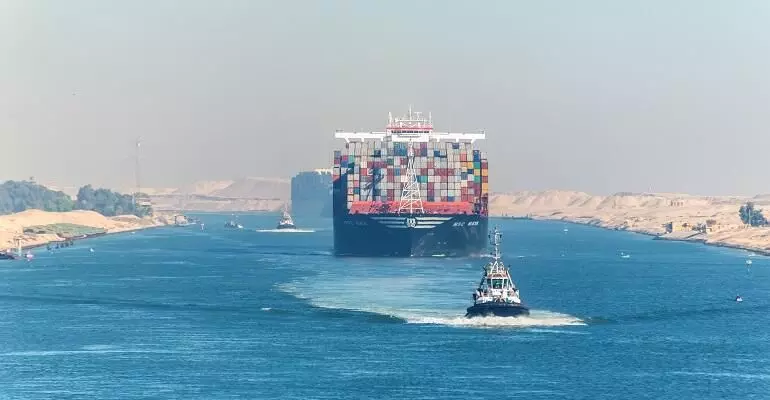Costly disruptions

In recent weeks, the Bab-el-Mandeb strait, a crucial maritime passage connecting the Arabian Peninsula and the Horn of Africa, has become a hotspot of tension and disruption. Iran-supported Houthi rebels in Yemen, responding to Israel's actions in Gaza, have intensified attacks on commercial vessels navigating through this vital waterway. The repercussions of this escalation are reverberating globally, particularly affecting the Red Sea and the Suez Canal — integral components of the world's maritime trade. The strategic importance of the Red Sea and the Suez Canal cannot be overstated. This waterway serves as a linchpin in connecting the Mediterranean Sea to the Red Sea and beyond, offering a shortcut for ships traveling between Europe and Asia. The canal plays a pivotal role in facilitating the transit of a substantial portion of the world's maritime trade, significantly reducing journey times and costs. The recent surge in attacks, however, has led to a concerning 44 per cent decrease in the number of ships passing through the Suez Canal compared to the average for the first half of December. Notably, the Suez Canal accounts for 10-15 per cent of global trade, including oil exports, and handles 30 per cent of global container shipping volumes. With disruptions in this crucial artery, the impact on global trade is multifaceted. Compounding the Red Sea crisis are disruptions in other key maritime routes, such as the Panama Canal, facing challenges due to drought. Geopolitical conflicts involving Russia-Ukraine and Israel-Hamas have already inflicted severe damage on the global economy and trade, exacerbating the strain on the world's economic health post the deadly Covid pandemic. As ships reroute their maritime trade through the Cape of Good Hope to circumvent the Red Sea disruptions, an additional 6,000 km and around two weeks are added to the journey duration. Some experts warn that if the Red Sea crisis persists, it could have stagflationary effects on the global economy. While current shipping disruptions are unlikely to derail the global trend of falling inflation, the situation remains precarious, especially if military tensions continue to escalate. The Red Sea crisis is a manifestation of geopolitical rivalry, with the United States and the Western world supporting Israel, while Iran and certain Islamic nations rally behind the Hamas-ruled Gaza Strip. This polarisation has far-reaching consequences, impacting not only the nations directly involved but also causing a ripple effect across the globe. India, a country that has traditionally maintained a neutral stance in geopolitical conflicts, is not immune to the trade disruptions. Preliminary assessments by the Research and Information System for Developing Countries indicate that India could witness a substantial drop in exports, with a potential curtailment of USD 30 billion in the current fiscal year. This represents a 6.7 per cent decrease in exports compared to the previous fiscal year's total of USD 451 billion. In the face of this escalating crisis, policymakers worldwide, including those in India, must closely monitor the situation and prepare for potential worst-case scenarios. Rather than getting entangled in bloc rivalries, India should strive to contribute towards the resolution of geopolitical conflicts. The need for diplomatic engagement and finding peaceful solutions becomes paramount to safeguard not only national interests but also the stability of the global economy. To sum up, the Red Sea crisis poses a significant threat to global trade and the world economy. With India also feeling the impact, it becomes imperative for nations to navigate these turbulent waters with prudence and diplomacy. As the world grapples with multiple challenges, fostering collaboration and seeking peaceful resolutions must be prioritised over exacerbating geopolitical tensions. Collaboration, peace and stability are the need of the hour, and nations must respond urgently.



